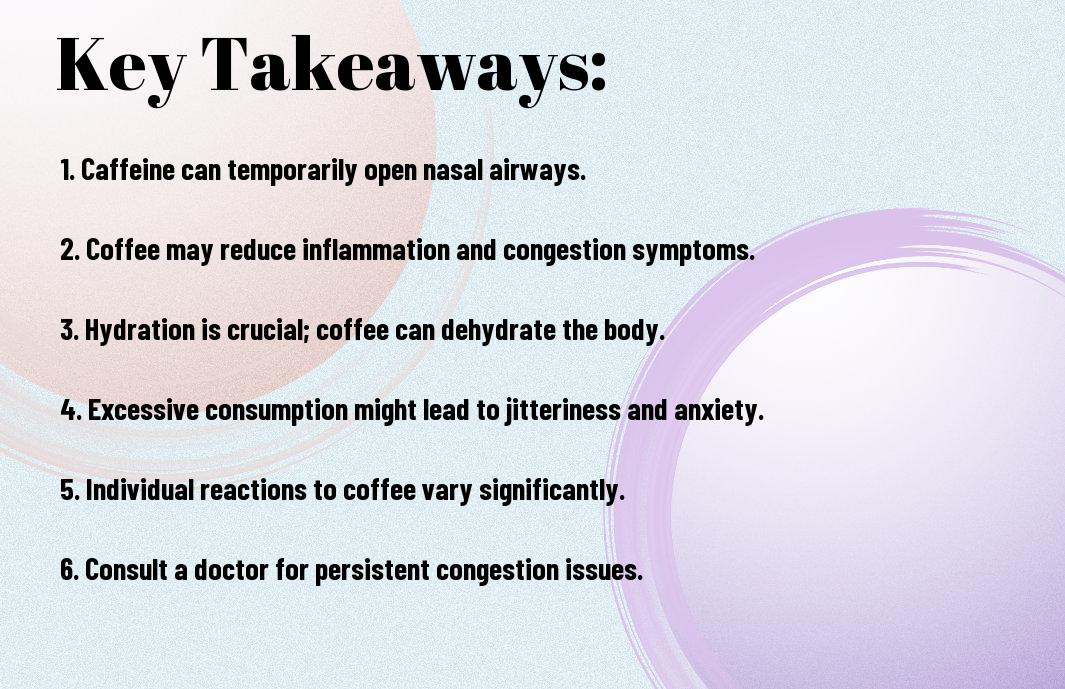With many people seeking relief from nasal congestion, you might be wondering if coffee can help ease your symptoms. This popular beverage contains caffeine, which may provide temporary relief by narrowing blood vessels in the nasal passages. However, it’s important to be aware of the potential drawbacks, such as dehydration and increased heart rate. Additionally, if you have conditions like asthma, consider checking out information about Coffee and Asthma for more insights. Understanding these factors can help you make informed choices regarding your nasal congestion relief.
Key Takeaways:
- Caffeine’s Role: Coffee contains caffeine, which can help temporarily relieve nasal congestion by opening up airways and improving airflow.
- Hydration Matters: While coffee has some benefits, it’s important to balance it with hydration, as caffeine can lead to dehydration, potentially worsening congestion symptoms.
- Individual Responses: The effects of coffee on nasal congestion can vary from person to person; some may find relief while others may experience increased symptoms due to caffeine sensitivity.

Understanding Nasal Congestion
The condition of nasal congestion occurs when the nasal passages become swollen or inflamed, ultimately leading to a sensation of stuffiness. This common discomfort can significantly impact your daily life, making simple tasks like breathing, sleeping, and even eating a challenge. Factors contributing to this condition range from common colds and allergies to sinus infections and structural abnormalities within the nasal cavity.
Causes of Nasal Congestion
By identifying the underlying causes, you can better address and manage nasal congestion. Common triggers include viral infections, allergies to pollen or dust, sinusitis, and even irritants like smoke or strong odors. Structural issues such as deviated septum or nasal polyps may also play a role in persistent discomfort.
Symptoms and Effects
Behind the feeling of congestion, you may experience a variety of symptoms, including difficulty breathing through your nose, a feeling of pressure in your sinuses, headache, and even reduced sense of taste or smell. These symptoms can lead to frustration and hinder your overall quality of life.
Effects of nasal congestion extend beyond mere discomfort; they can disrupt your sleep, cause fatigue, and create challenges in social situations. Additionally, chronic congestion may lead to complications, such as sinus infections, if not managed properly. It’s important to prioritize your health and seek solutions to alleviate these burdens.
When to Seek Medical Attention
Above all, knowing when to seek medical attention is vital for your health. If your nasal congestion persists for more than ten days, or if you experience severe symptoms such as high fever, facial pain, or swelling, it’s important to consult a healthcare professional. These signs could indicate a more serious underlying condition.
Understanding the scope of your symptoms is key in determining when medical help is necessary. If you find that your nasal congestion is affecting your ability to perform daily activities, or if you notice any serious complications, do not hesitate to reach out for professional advice. Taking swift action can help you avoid complications and improve your overall wellbeing.

The Science Behind Coffee
Some of the benefits and effects of coffee can be traced back to its unique chemical composition. Understanding its components, particularly its most well-known ingredient, caffeine, can help you determine how coffee may influence various health conditions, including nasal congestion.
Composition of Coffee
An average cup of coffee contains over 1,000 different compounds, including caffeine, antioxidants, lipids, carbohydrates, and various acids. These elements work together to create the beverage’s distinctive flavor and aroma while also contributing to its impact on your health.
Caffeine and its Effects on the Body
Across various studies, caffeine has been studied for its stimulating effects on the central nervous system, promoting alertness and enhancing cognitive function. Additionally, caffeine is known to act as a mild vasodilator, which can temporarily ease blood flow, potentially affecting respiratory issues like nasal congestion.
Coffee plays a significant role in many people’s daily routines, and its effects go beyond just keeping you awake. The vasodilatory properties of caffeine might also help with easing sinus pressure and reducing inflammation, making it a possible ally in combating nasal congestion. However, it’s crucial to moderate your intake to avoid side effects such as jitters or sleep disturbances.
Common Myths about Coffee
Before delving deeper, you might have heard several myths about coffee that can cloud your understanding. For instance, many believe that coffee dehydrates you or that it is excessively harmful to your heart.
In fact, many of these perceptions are exaggerated. Coffee does not significantly cause dehydration, and numerous studies have demonstrated that moderate consumption is generally safe for most individuals. Additionally, while high caffeine intake may pose risks, moderate coffee drinking has been associated with various health benefits, which should encourage you to consider your personal consumption habits carefully.
The Impact of Caffeine on Nasal Congestion
Now, understanding how caffeine interacts with nasal congestion can help you make informed choices about your coffee consumption. Caffeine is known for its vasoconstrictive properties, which can lead to a temporary reduction in swelling within the nasal passages. This may provide some relief from congestion, making it easier for you to breathe.
How Caffeine Affects Nasal Airways
By constricting blood vessels in the nasal region, caffeine may result in reduced inflammation of the nasal mucosa, potentially alleviating the sensation of stuffiness. This can create a feeling of improved airflow, though the effects are often short-lived.
Potential Benefits of Coffee for Congestion
Against traditional wisdom, coffee’s caffeine content can actually provide some unexpected relief from nasal congestion. For people suffering from allergies or colds, a cup of coffee may act as a temporary decongestant, enhancing your overall comfort during those pesky, stuffy days.
Also, caffeine can stimulate the central nervous system, which may increase your body’s response to allergens or irritants. This means when you consume coffee, it could help your body fight off congestion more effectively. While it is not a cure, sipping on a warm cup can certainly make you feel less hindered by nasal blockages.
Research Findings
Above all, several studies have investigated the relationship between caffeine consumption and nasal congestion, revealing various findings that support the positive effects. Researchers have noted improvements in nasal airflow and reduced congestion symptoms after caffeine intake.
The evidence suggests that caffeine may improve your experience when dealing with nasal congestion, particularly during cold or allergy seasons. However, be cautious, as overconsumption may lead to increased dehydration, which can exacerbate nasal issues. Balancing coffee intake while ensuring proper hydration is important for reaping the benefits without the drawbacks.

Additional Benefits of Coffee
Despite its potential drawbacks, coffee offers a variety of additional benefits that may help you tackle nasal congestion and overall health. From its anti-inflammatory properties to aiding in pain relief, your daily cup can do more than just keep you awake.
Anti-Inflammatory Properties
Coffee contains compounds that exhibit anti-inflammatory properties, which can be beneficial for reducing inflammation associated with nasal congestion. By lowering inflammation, coffee may help soothe your airways, making it easier for you to breathe when you’re dealing with a cold or allergies.
Pain Relief and Headache Prevention
Anti-inflammatory effects found in coffee can also play a role in providing pain relief and preventing headaches. Caffeine, a key component of coffee, is known to constrict blood vessels and reduce the severity of headaches, including tension and migraine headaches.
To maximize the benefits, consider incorporating coffee into your routine when you feel a headache approaching. The caffeine can help decrease the intensity of the headache and provide a quick source of relief. However, it’s important to be cautious, as too much caffeine can lead to its own set of headaches.
Hydration and its Role in Congestion
Among the various factors affecting your congestion, staying adequately hydrated is imperative. While coffee has a mild diuretic effect, it can still contribute to your daily fluid intake, potentially helping in alleviating symptoms of nasal congestion.
Another way hydration plays a role in nasal congestion is by thinning mucus, making it easier for your body to expel. When you’re well-hydrated, mucus becomes less viscous, which can facilitate drainage and help reduce congestion. So, while coffee has its benefits, make sure you’re also consuming enough water throughout the day.
Risks and Considerations
All health benefits come with potential risks, and coffee is no exception. While it may relieve nasal congestion for some, there are factors you should consider before relying on it as a remedy. For insights on possible interactions, you may want to check out Can you Drink Coffee with Sinus Infection?. Understanding these factors will help you make informed decisions about your health.
Caffeine Sensitivity and Side Effects
Along with its benefits, coffee can cause side effects, especially for those who are sensitive to caffeine. Symptoms like increased heart rate, nervousness, or digestive issues may occur. If you know you are caffeine-sensitive, it’s wise to limit your intake while seeking relief from nasal congestion.
Coffee as a Diuretic: Implications for Hydration
Below the surface benefits, coffee is known to act as a diuretic, potentially affecting your hydration levels. While moderate consumption might not significantly dehydrate most people, excessive intake can lead to increased urination and fluid loss, which is not ideal when you are already battling nasal irritation.
Further, dehydration can exacerbate nasal congestion, thickening mucus and making it harder to breathe. It’s important to balance your coffee intake with ample water to maintain hydration during your recovery.
Interactions with Medication
By consuming coffee while on medication, you might inadvertently affect how your medications work. Certain drugs can interact negatively with caffeine, diminishing their effectiveness or amplifying side effects. Always consult with a healthcare professional before mixing coffee with your prescribed treatments.
Plus, some over-the-counter medications, especially those for cold and sinus relief, may contain stimulants similar to caffeine. The combination could lead to heightened side effects such as increased heart rate or blood pressure levels, making it vital to be cautious about coffee consumption while medicating.
Alternatives to Coffee for Nasal Congestion
Once again, while coffee may provide temporary relief for nasal congestion, there are several alternatives you can explore that may be equally beneficial or even more suited to your needs.
Herbal Remedies
Across many cultures, herbal remedies have been utilized to combat nasal congestion. Herbs like peppermint and eucalyptus are known to open nasal passages, making it easier for you to breathe. Consider using herbal teas or necessary oils that contain these ingredients for effective relief.
Home Remedies and Lifestyle Changes
On a more practical note, home remedies and lifestyle changes can play a significant role in alleviating nasal congestion.
A simple approach includes staying well-hydrated by drinking plenty of water, which helps thin mucus. Additionally, adding moisture to the air with a humidifier and practicing steam inhalation can provide immediate relief. Nasal saline sprays are also effective for clearing out your nasal passages. Furthermore, using a warm compress on your face may ease discomfort and promote drainage.
When to Try a Different Approach
Against the notion that coffee is a go-to solution, there are instances when exploring other options is advisable.
With persistent or severe nasal congestion, it may be more effective to consult a healthcare professional. They can guide you towards treatments that address underlying conditions, such as allergies or infections, ensuring that your approach doesn’t mask a more serious issue. Don’t hesitate to look for medical advice if your symptoms worsen or if you experience additional concerning symptoms.
Conclusion
Taking this into account, coffee can offer both benefits and risks for managing nasal congestion. The caffeine in coffee may temporarily relieve symptoms by acting as a decongestant; however, excessive consumption can lead to dehydration, which might worsen congestion. It’s important to listen to your body and consider other remedies for long-term relief. Ultimately, maintaining a balanced approach to your coffee intake can help you navigate your nasal health effectively.
FAQ
Q: Does caffeine in coffee help relieve nasal congestion?
A: Yes, caffeine may help alleviate nasal congestion temporarily. It acts as a mild vasodilator, which can reduce inflammation in the nasal passages, potentially leading to improved airflow. However, the relief may be short-lived and should not replace other treatments for chronic congestion.
Q: Are there any additional benefits of drinking coffee when I’m congested?
A: Besides potential temporary relief from nasal congestion, coffee can also act as a diuretic, which might help in reducing bloating and pressure in the sinuses. Additionally, the warmth of a hot cup of coffee can provide comfort and help soothe irritated throats, which can often accompany nasal congestion.
Q: Can coffee worsen my nasal congestion symptoms?
A: For some individuals, coffee may lead to dehydration, which can thicken mucus and make congestion worse. Also, if you have specific sensitivities or allergies, the acidity in coffee could potentially irritate your sinuses. It’s important to observe how your body reacts to coffee when congested.
Q: Is decaffeinated coffee beneficial for nasal congestion?
A: Decaffeinated coffee may not have the same stimulant effects as regular coffee, but it can still provide warmth and hydration. Drinking decaffeinated coffee can be soothing and comforting without the potential side effects of caffeine, making it a good option for those who are sensitive to caffeine.
Q: What should I consider before drinking coffee for nasal congestion?
A: Before opting for coffee as a solution for nasal congestion, consider your individual health conditions, such as caffeine sensitivity, acid reflux, or allergies. If you are on medication, especially antihistamines or decongestants, consult with a healthcare provider to ensure coffee will not interact negatively with your treatment.
Q: How much coffee is safe to consume when dealing with nasal congestion?
A: Moderation is key. It’s advisable to limit coffee intake to 1-2 cups a day, especially if you’re experiencing nasal congestion. Excessive consumption may lead to increased dehydration and can interfere with sleep, which is not ideal when recovering from congestion or a cold.
Q: Are there alternative remedies for nasal congestion if I want to avoid coffee?
A: Absolutely! Alternative remedies include steam inhalation, saline nasal sprays, warm teas, and hydration through water or herbal drinks. Spicy foods can also help clear nasal passages. It’s important to find what works best for you and consult your healthcare provider if symptoms persist.
